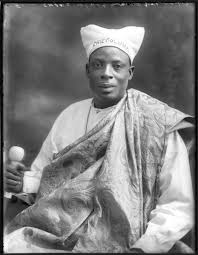Chief Amodu Tijani Oluwa, commonly known as Amodu Tijani, was a prominent Yoruba traditional chief and Nigerian nationalist during the high colonial period. He held the revered title of the Oluwa of Lagos.
Life and Heritage
- Chief Oluwa was a member of the Idejo class of Lagos’ hereditary nobility.
- He was a direct descendant of Olofin Ogunfunmire, a foundational figure in Lagos history.
- His family exercised land rights and authority over a region comprising villages and towns in the Apapa area of Lagos.
Political Activism and Nationalism
- Oluwa was a fierce nationalist, opposing the British colonial government's actions against traditional rulers.
- He notably defended the rights of Oba Eshugbayi Eleko, the then Oba of Lagos, whose ancestral powers were being suppressed by the colonial regime.
- Chief Oluwa was a co-founder of the National Congress of British West Africa, a pioneering pan-African organization advocating for African rights within British colonies.
Landmark Legal Case (1920–1921)
In 1920, Chief Oluwa, Prince Adeniji Adele, and Herbert Macaulay traveled to London to appear before the Privy Council in the case:
Amodu Tijani v Secretary, Southern Nigeria
- The case revolved around land ownership and British expropriation of native lands in Lagos.
The Privy Council ruled in their favour, affirming that:
Traditional chiefs were absolute owners of the land, with rights that the colonial government could not arbitrarily override.
This ruling became a landmark decision in colonial legal history.
- It set precedents for land tenure law not only in Nigeria, but also in India, New Zealand, and other British territories.
Legacy
- Oluwa’s victory led to widespread songs and poems composed in his honour.
- His name remains significant in discussions of customary land rights and colonial legal resistance.
Transcript of the Judgement
A summary transcript of the final judgement in Amodu Tijani vs. The Secretary of the Southern Provinces (1921) can be found here:
(Insert link to the transcript or legal summary if available)
